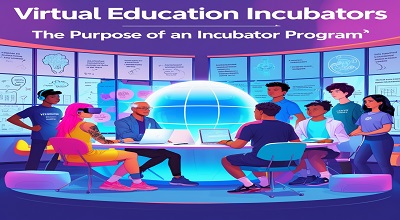Virtual Education Incubators
In the rapidly evolving landscape of education, virtual education incubators have emerged as a transformative force. These incubators serve as platforms that nurture innovative educational ideas and practices, helping educators and entrepreneurs develop their concepts into viable educational ventures. This article delves into the concept of virtual education incubators, their significance, and the various purposes they serve in the educational ecosystem.
What is a Virtual Education Incubator?
A virtual education incubator can be defined as a catalyst for socio-economic development, providing a structured process for developing early-stage educational ideas into viable ventures. Unlike traditional incubators that require physical presence, virtual incubators leverage technology to offer support and resources to educators and entrepreneurs from anywhere in the world. This flexibility allows for a broader reach and the ability to support a diverse range of educational initiatives.
Key Features of Virtual Education Incubators
- Accessibility: Virtual incubators break down geographical barriers, allowing participants from various locations to access resources and mentorship.
- Scalability: They can support an infinite number of firms, unlike conventional incubators that often face physical space limitations.
- Resource Sharing: Participants can benefit from shared resources, including funding opportunities, mentorship, and networking.
- Continuous Improvement: Virtual incubators embody a mindset of growth and experimentation, encouraging participants to innovate and adapt.
The Purpose of an Incubator Program
Incubator programs serve multiple purposes, each aimed at fostering innovation and supporting the growth of educational initiatives. Here are some of the primary objectives of these programs:
1. Nurturing Innovative Ideas
Incubator programs provide a safe space for educators and entrepreneurs to experiment with new ideas. By offering mentorship and resources, these programs help participants refine their concepts and develop them into viable educational solutions.
2. Providing Access to Resources
One of the most significant advantages of incubator programs is the access they provide to essential resources. This includes funding opportunities, workspace, and educational materials. Participants can leverage these resources to accelerate their projects and enhance their chances of success.
3. Building a Supportive Community
Incubators foster a sense of community among participants. This network of like-minded individuals can provide emotional support, share experiences, and collaborate on projects. The connections made within an incubator can lead to valuable partnerships and collaborations.
4. Facilitating Networking Opportunities
Incubator programs often have strong networks of influential individuals and organizations. This network can connect participants with established businesses, potential investors, and industry experts, providing invaluable opportunities for growth and development.
5. Enhancing Skills and Knowledge
Participants in incubator programs often receive training and workshops that enhance their skills and knowledge. This education can cover various topics, including business development, marketing strategies, and presentation skills, equipping participants with the tools they need to succeed.
6. Encouraging Experimentation and Adaptation
Virtual education incubators promote a culture of experimentation. Participants are encouraged to test their ideas, gather feedback, and adapt their approaches based on real-world insights. This iterative process is crucial for developing effective educational solutions.
7. Driving Economic Development
By supporting the growth of innovative educational ventures, incubator programs contribute to economic development. Successful educational initiatives can create jobs, stimulate local economies, and enhance the overall quality of education.
The Impact of Virtual Education Incubators
The impact of virtual education incubators extends beyond individual participants. They play a crucial role in shaping the future of education by fostering innovation and collaboration. Here are some of the ways they influence the educational landscape:
1. Promoting Educational Equity
Virtual incubators can help bridge the gap in educational access by supporting initiatives that target underserved communities. By providing resources and support to these initiatives, incubators can contribute to a more equitable educational landscape.
2. Encouraging Lifelong Learning
The flexibility of virtual incubators allows for the development of programs that cater to diverse learning needs. This encourages lifelong learning and supports individuals in their pursuit of knowledge and skills throughout their lives.
3. Fostering Global Collaboration
Virtual education incubators facilitate collaboration among educators and entrepreneurs from different parts of the world. This global perspective can lead to the sharing of best practices and innovative solutions that benefit the entire educational community.
4. Adapting to Technological Advancements
As technology continues to evolve, virtual incubators are well-positioned to adapt and incorporate new tools and methodologies into their programs. This adaptability ensures that participants are equipped to navigate the changing educational landscape.

Challenges Faced by Virtual Education Incubators
While virtual education incubators offer numerous benefits, they also face challenges that can impact their effectiveness. Understanding these challenges is essential for improving the incubator model and maximizing its potential.
1. Limited Face-to-Face Interaction
The virtual nature of these incubators can limit opportunities for face-to-face interaction, which is often crucial for building strong relationships and fostering collaboration. Finding ways to facilitate meaningful connections in a virtual environment is essential.
2. Resource Constraints
Some virtual incubators may struggle with limited resources, which can hinder their ability to provide comprehensive support to participants. Ensuring adequate funding and access to resources is vital for the success of these programs.
3. Maintaining Engagement
Keeping participants engaged in a virtual setting can be challenging. Incubators must develop strategies to maintain motivation and enthusiasm among participants, ensuring they remain committed to their projects.
4. Navigating Technological Barriers
Not all participants may have equal access to technology, which can create disparities in participation. Incubators must address these barriers to ensure inclusivity and equal opportunities for all participants.
Future Trends in Virtual Education Incubators
As the educational landscape continues to evolve, virtual education incubators are likely to adapt and innovate in response to emerging trends. Here are some potential future developments:
1. Increased Focus on Personalization
Future incubators may place a greater emphasis on personalized learning experiences, tailoring support and resources to meet the unique needs of each participant.
2. Integration of Artificial Intelligence
The incorporation of artificial intelligence (AI) into incubator programs could enhance the support provided to participants. AI tools can analyze data, provide insights, and offer personalized recommendations, improving the overall effectiveness of the incubator.
3. Expansion of Global Networks
As virtual incubators continue to grow, we can expect to see an expansion of global networks that connect educators and entrepreneurs from diverse backgrounds. This collaboration can lead to innovative solutions that address global educational challenges.
4. Emphasis on Sustainability
Future incubators may prioritize sustainability, encouraging participants to develop educational initiatives that promote environmental awareness and social responsibility.
FAQs
1. What is the primary goal of a virtual education incubator?
The primary goal of a virtual education incubator is to nurture innovative educational ideas and support their development into viable ventures through mentorship, resources, and networking opportunities.
2. How do virtual education incubators differ from traditional incubators?
Virtual education incubators operate online, allowing participants to access resources and support from anywhere, while traditional incubators typically require physical presence and may have space limitations.
3. What types of resources do virtual education incubators provide?
Virtual education incubators provide a range of resources, including funding opportunities, mentorship, training workshops, and access to a network of industry experts and potential collaborators.
4. Can anyone join a virtual education incubator?
Most virtual education incubators have specific criteria for participation, often targeting educators, entrepreneurs, or individuals with innovative educational ideas. However, many are open to a diverse range of participants.
5. How do virtual education incubators contribute to economic development?
By supporting the growth of innovative educational ventures, virtual education incubators can create jobs, stimulate local economies, and enhance the overall quality of education, contributing to economic development.
6. What challenges do virtual education incubators face?
Challenges include limited face-to-face interaction, resource constraints, maintaining participant engagement, and navigating technological barriers that may affect access and participation.
7. What is the future of virtual education incubators?
The future of virtual education incubators may include increased personalization, integration of artificial intelligence, expansion of global networks, and a greater emphasis on sustainability in educational initiatives.
Conclusion
Virtual education incubators represent a significant advancement in the educational landscape, providing essential support and resources to innovators in the field. By nurturing ideas, fostering collaboration, and driving economic development, these incubators play a crucial role in shaping the future of education. As they continue to evolve, their impact will likely expand, paving the way for a more innovative and equitable educational ecosystem.
